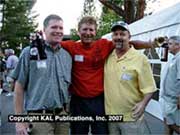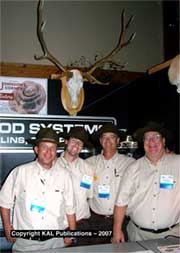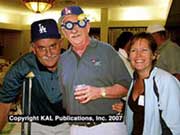
October 2007 Issue Highlights
For more complete coverage, send us an e-mail to
request a back issue.

For more complete coverage, send us an e-mail to
request a back issue.

Northwest Pump Customer Appreciation BBQ

Colorado-Wyoming Petroleum Marketers Association Convention

RHL Golf Invitational
Want to see the photos that didn't make the issue? Check out the Cutting Room Floor.
SC Fuels To Merge Cardlocks With United Fuel
Chevron Ready To Supply E10 To Oregon
New Wyoming Refinery To Start Up In December
Sinclair To Increase Supply From Tulsa Refinery
Union Pacific Pays $120,000 In Truck
Emissions Fines
ORANGE, CA. — SC Fuels, based here, has signed an agreement to combine its cardlock operations with those of United Fuel & Energy Corporation, based in Midland, TX.
United Fuel operates over 100 cardlocks as well as distributing fuel in Texas, New Mexico, Arizona, and Oklahoma.
As part of the "definitive purchase agreement," Frank Greinke, chairman of SC Fuels, will serve as chairman of the Board for United Fuel as well as become the majority stockholder of United Fuel, a publicly traded company.
Chuck McArthur will continue in his role as United Fuel president and CEO for at least the next three years.
"This acquisition is a significant milestone for United Fuel because it will give us the critical mass we need to take the company to the next level of growth," stated McArthur. "By combining with SC Fuel's cardlock operations, United Fuel will significantly increase its net income, expand its operations in the Western U.S. and be positioned to further increase operating efficiencies due to our larger size."
"We are pleased to have this opportunity to merge SC Fuels' experience and success in the petroleum distribution business with United Fuel's expertise in the public capital markets," stated Greinke, announcing the deal. "Together, Cardlock Fuels and United Fuel will create a powerful alliance by which to rapidly expand our cardlock and fuel access card programs."
Greinke added, "We will quickly expand our combined operations by joining together on acquisitions that further enhance our ability to expand our market presence."
The cardlock merger was finalized in September.
PORTLAND, OR. — In response to Oregon state legislation requiring that in the future all gasoline sold in the state must have at least 10% ethanol, Chevron has told jobbers that it is prepared to begin selling E-10 statewide.
Chevron has been delivering E-10 to Chevron and Texaco jobbers and stations in Portland since July. They noted this was months ahead of the city's 10 percent ethanol blend mandate for gasoline. E10-blended gasoline is required to be sold at the retail level in the city of Portland by Nov. 1.
Under Oregon's Biofuels Bill HB 2210, all gasoline sold in the state must contain a 10 percent ethanol blend three months after production of ethanol in Oregon reaches at least 40 million gallons per year.
Chevron officials predict that "based on publicly available estimates," the 10 percent ethanol blend requirement could be triggered as early as the first quarter of 2008.
The bill also requires that all diesel fuel sold in Oregon must be blended with 2 percent biodiesel when the production of biodiesel in the Pacific Northwest reaches at least 5 million gallons per year. The biodiesel blending requirement increases to 5 percent when annual production reaches a level of at least 15 million gallons per year.
DOUGLAS, WY. — Interline Resources Corp., reports it has begun final construction of a diesel and gasoline refinery here, the first new refinery built in Wyoming in 25 years.
The refinery, which will be operating as Northcut Refining, LLC, will be capable of producing 4,000 barrels a day of diesel fuel and gasoline for blending with ethanol. The facility will use crude oil pumped from the Powder River Basin as its base stock.
Northcut Refining has been granted small refiner status by the Environmental Protection Agency, allowing it to produce 500 parts per million sulfur diesel until 2014 for the sale to off-road users.
After 2014, the higher sulfur diesel fuel only can be sold to the locomotive market. "Almost all refineries now must meet very low sulfur specifications for their diesel products. This requires very expensive processing equipment," noted Michael Williams, CEO of Interline. "Because the Douglas facility has been classified as a small refiner by the EPA, the sulfur specifications are not as stringent, and we do not have to install the expensive de-sulphurization equipment. This really reduces our capital and operating costs."
The new refinery is expected to be operational in December.
Northcut Refining parent company Interline Resources Corp. is based in Alpine, UT.
SALT LAKE CITY, UT. — Supply in the Rocky Mountains and Midwest should increase as Sinclair Oil Corp., has announced a major expansion of its Tulsa, OK., refinery.
The $1 billion expansion has been in the planning and permitting stages since 2005; construction is now expected to begin in 2008. When completed, capacity at the refinery should increase 60% from 70,000 barrels per day to 115,000 barrels per day. In addition, the expansion will allow the Tulsa refinery to process a wider range of crude oils, allowing it to utilize more product from the U.S. and Canada, while improving emissions from the facility.
The refinery expansion project is expected to be completed by late 2010.
SACRAMENTO, CA. — Union Pacific Railroad has paid a $120,000 fine to California for failing to inspect their diesel trucks to verify that they met state emissions limits.
Under California's Periodic Smoke Inspection program, owners of diesel fleets with two or more heavy-duty diesel engines are required to inspect, maintain, and keep records of their emissions-related activities.
The fine followed a 2004-2005 investigation by the California Air Resources Board which claimed that Union Pacific failed to properly inspect and document its diesel trucks' emissions throughout the state.
"Compliance with our regulations is the crux to clean healthful air for all Californians," said CARB Acting-Executive Officer, Tom Cackette. "We need companies to recognize that Californians demand clean air and that enforcement actions are an extension of their desire to live in a healthy and respected environment."
Omaha, Nebraska-based Union Pacific paid most of the settlement to the California Air Pollution Control Fund, which supports pollution research and related programs.
Originally published in the October 2007 issue of O&A Marketing News.
Copyright 2007 by KAL Publications Inc.
Serving the 13 Western States, the World's Largest Gasoline, Oil, Fuel, TBA and Automotive Service Market